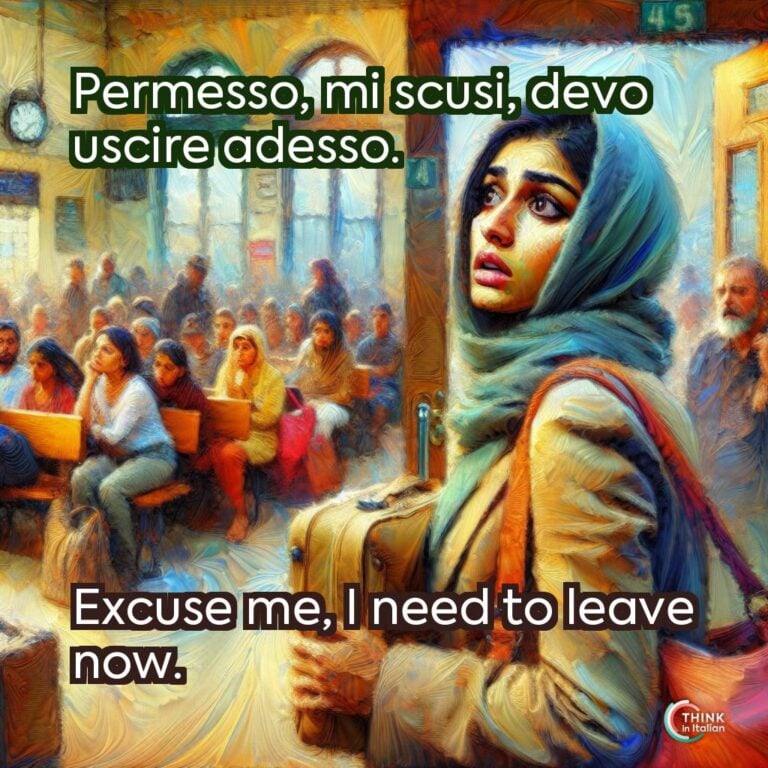“Excuse me” in Italian
Scusa/Scusi
Scusa is the most straightforward way to translate “excuse me” or “sorry” in Italian. It is used in informal situations, like when you’re talking to friends, family, or anyone you’re on familiar terms with. For example:
Scusa, puoi passarmi il sale?
Excuse me, can you pass me the salt?
Scusi is the formal version of scusa, and you can use it when you are speaking to someone you don’t know well, or in more respectful settings, like with elders, strangers, or professionals. This word helps you remain polite while keeping some distance. For instance:
Scusi, sa dov’è il museo?
Excuse me, do you know where the museum is?
In Italian, both forms come from the verb scusare (to forgive) used in the imperative mood to express a command or request for forgiveness.
The main difference is that scusa is a second-person singular conjugation, that is, an informal imperative form, used to address to tu (you). Instead, scusi is a third-person singular conjugation, that is, a formal imperative form, used to address to the formal Lei (formal “you”).
Of course, once you have learned its conjugation, you can use this verb with other subjects as well:
Scusatemi, siete voi gli amici di Luca?
Sorry, are you (all) Luca’s friends?
Scusami/Mi Scusi
Whether you are using the formal or informal expression also affects the use of pronouns with imperatives. Let me show you what I mean by that with the following two examples:
Scusami Mario, posso usare il tuo telefono?
Excuse me, Mario, can I use your phone?
Mi scusi, a che ora parte il treno?
Excuse me, what time does the train leave?
As you can see, in both sentences the speaker is using the indirect pronoun mi (to me). This happens because the verb scusare in Italian is an intransitive verb, requiring an indirect object.
The pronoun placement with verbs depends entirely on whether the verb is informal – pronoun at the end – or formal – pronoun at the beginning.
Perdonami/Mi Perdoni
Mi perdoni is the Italian equivalent of “pardon me”. Like mi scusi, it can be used to request attention or to formally request to be forgiven.
On the same wave of scusami or mi scusi, pronouns placement depends on whether you choose to use the formal or informal version.
Mi perdoni, saprebbe dirmi come arrivare in Via Roma?
Pardon me, can you tell me how to get to Via Roma?
Perdonami, non sapevo che vi foste lasciati.
Forgive me, I did not know you broke up.
Chiedo Scusa
Chiedo scusa literally means “I ask (you to) excuse (me)” or “I ask for an apology”. It is a formal way to say “excuse me”, focusing on you apologizing, rather than on your interlocutor forgiving you.
In fact, in this expression, the verb chiedere (to ask) is conjugated in the first person singular.
Chiedo scusa, potrei usare il bagno?
Excuse me, can I use the toilet?
Chiedo scusa, non ho capito bene. Può ripetere?
I beg your pardon, I didn’t understand well. Can you repeat that?
Permesso
Permesso is specifically used when you’re physically trying to pass by someone in a crowded place or tight space. It is the past participle of the verb permettere (to allow), therefore meaning “allowed”. It is used as a kind request to be allowed to pass.
Permesso, posso passare?
Excuse me, can I pass through?
Italians also use it when they’re entering someone’s house, therefore meaning “may I come in?”.
Permesso? Wow, che bella casa!
May I come in? Wow, what a beautiful home!






